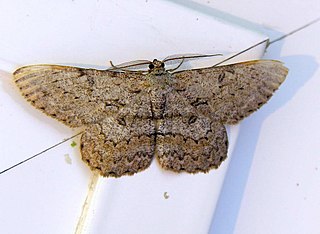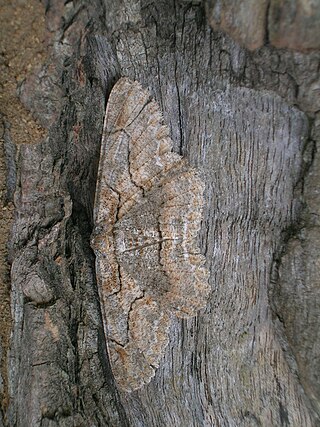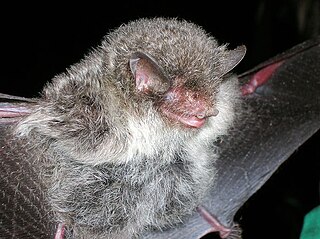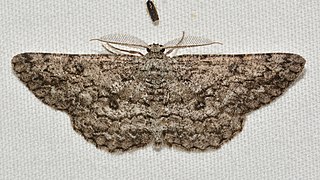
The cinereous bunting is a bird in the bunting family Emberizidae, a passerine family now separated by most modern authors from the finches, Fringillidae. This species was first described by Christian Ludwig Brehm.

The Timor imperial pigeon is a species of bird in the family Columbidae. It is found on Timor and Wetar. Its natural habitats are subtropical or tropical dry forests and subtropical or tropical moist montane forests. It is threatened by habitat loss.

Hypomecis punctinalis, the pale oak beauty, is a moth of the family Geometridae. The species was first described by Giovanni Antonio Scopoli in his 1763 Entomologia Carniolica. The species can be found in central and southern Europe, Asia Minor, Transcaucasia, Russia, the Russian Far East, Japan, Korea, Ussuri and western China.

Hypomecis roboraria, the great oak beauty, is a moth of the family Geometridae. The species occurs in the Palearctic. The nominate subspecies is found in Europe. The subspecies isabellaria is found in western Central Asia east across Siberia and Mongolia to northern China.

Boarmia driophila is a moth of the family Geometridae first described by G. M. Goldfinch in 1944. It is found in Australia.

Hypomecis is a genus of moths in the family Geometridae first described by Jacob Hübner in 1821.
Metallolophia cineracea is a moth of the family Geometridae first described by Jeremy Daniel Holloway in 1996. It is found on Borneo and Peninsular Malaysia. The habitat consists of lowland heath forests.

Fea's tube-nosed bat, also known as the ashy tube-nosed bat, is a species in the vesper bat in the family Vespertilionidae, found in southeastern Asia and southern China. They have tube-shaped nostrils which assist them with their feeding. It is named after Italian naturalist Leonardo Fea.

Hypomecis separata is a species of moth of the family Geometridae. It was first described by Francis Walker in 1863. It is found in Sri Lanka, India, Java and Borneo.
Mimocularia cineracea is a species of beetle in the family Cerambycidae, and the only species in the genus Mimocularia. It was described by Stephan von Breuning in 1970.
Ocularia cineracea is a species of beetle in the family Cerambycidae. It was described by Karl Jordan in 1894.

Mecas cineracea is a species of longhorn beetles found in the United States and Mexico. It was described by Thomas Lincoln Casey, Jr. in 1913.
Hypomecis adamata is a moth of the family Geometridae first described by Felder in 1874. It is found in Sri Lanka.

Hypomecis transcissa is a moth of the family Geometridae first described by Francis Walker in 1860. It is found in the Indian subregion and from Sri Lanka to Sundaland.
Hypomecis luridula is a species of geometrid moth in the family Geometridae. It is found in North America.
Hypomecis buchholzaria, known generally as the blue spiderwort moth or Buchholz's gray, is a species of geometrid moth in the family Geometridae. It is found in North America.
Hypomecis gnopharia is a species of geometrid moth in the family Geometridae. It is found in North America.
Hypomecis longipectinaria, the hybrid fescue, is a species of geometrid moth in the family Geometridae. It is found in North America.

Hypomecis umbrosaria, the umber moth, is a species of geometrid moth in the family Geometridae. It is found in North America.

Hypomecis lioptilaria is a species from the genus Hypomecis. The species was originally described by Charles Swinhoe in 1901











